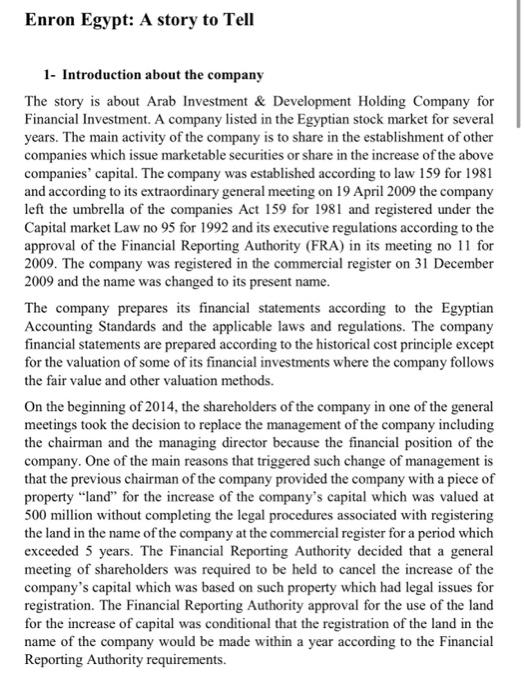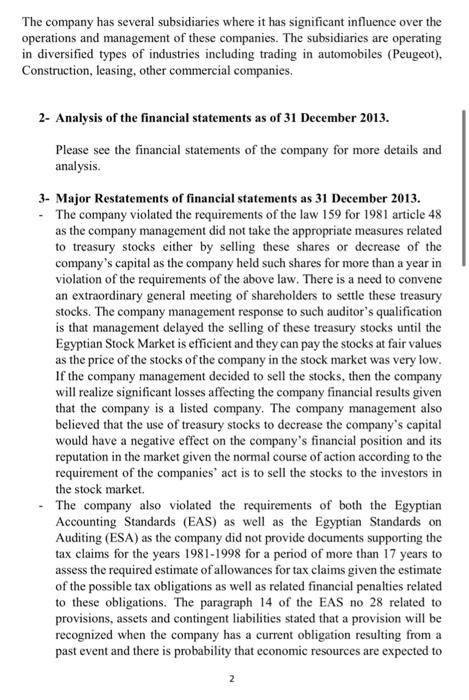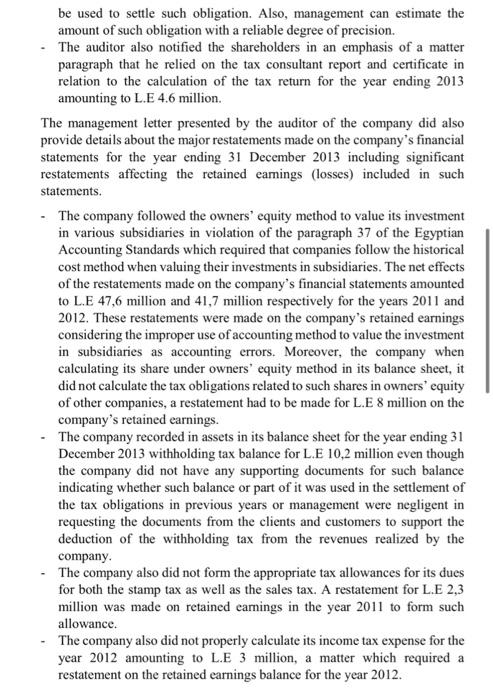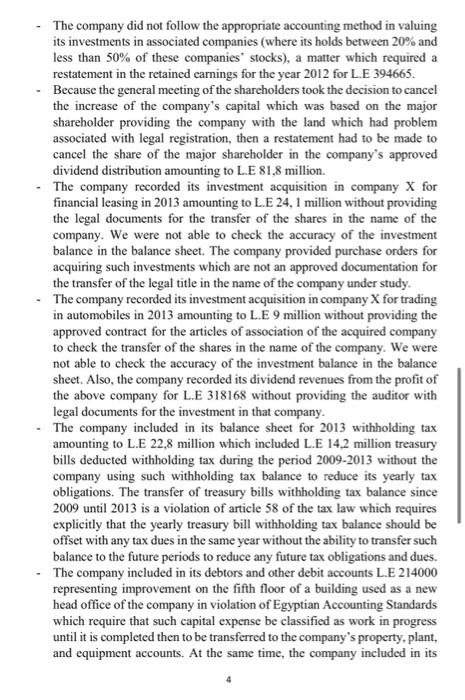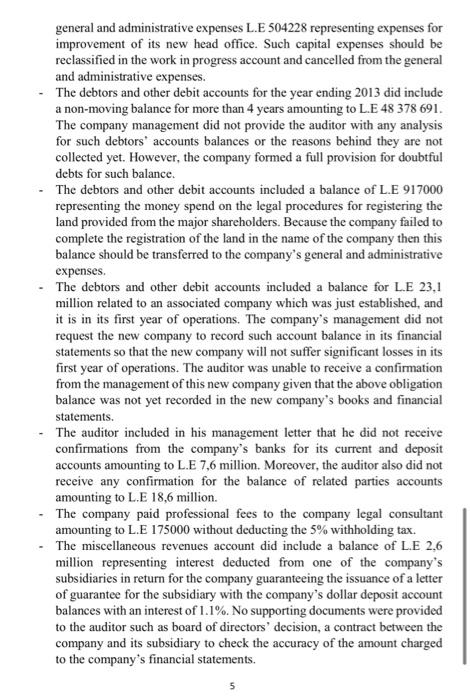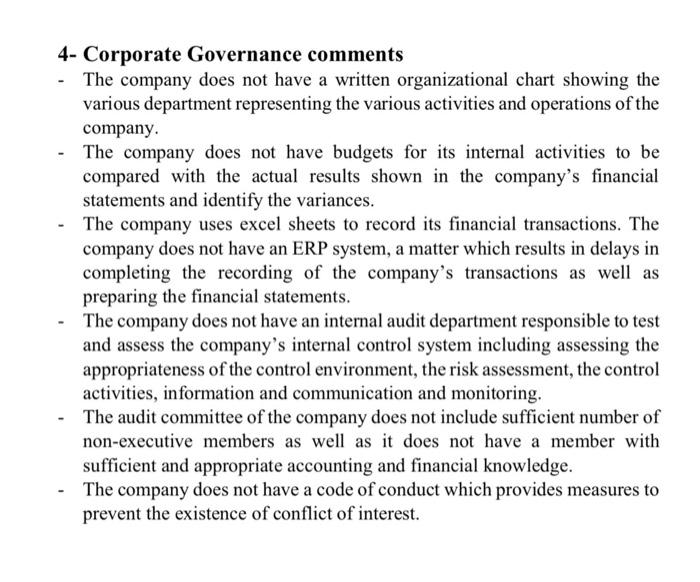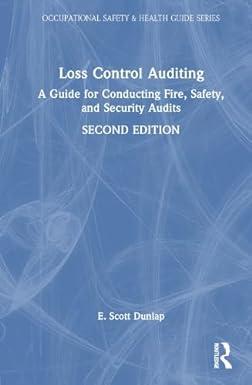Shareholders(you) will do a brief presentation of the case explaining all the facts related to the case under study. This will include presenting the nature of the company being investigated, the characteristics of its management if any, its accounting system and related financial statements and any other aspects of the companys operations and activities. Moreover, shareholders will present misstatements either errors or fraud showing what their nature, why they occurred, how they damage their investments always referring to the requirements of the various laws and International Financial Reporting Standards and how management and auditors depart from the requirements
of such laws and standards.
1- Introduction about the company The story is about Arab Investment \& Development Holding Company for Financial Investment. A company listed in the Egyptian stock market for several years. The main activity of the company is to share in the establishment of other companies which issue marketable securities or share in the increase of the above companies' capital. The company was established according to law 159 for 1981 and according to its extraordinary general meeting on 19 April 2009 the company left the umbrella of the companies Act 159 for 1981 and registered under the Capital market Law no 95 for 1992 and its executive regulations according to the approval of the Financial Reporting Authority (FRA) in its meeting no 11 for 2009. The company was registered in the commercial register on 31 December 2009 and the name was changed to its present name. The company prepares its financial statements according to the Egyptian Accounting Standards and the applicable laws and regulations. The company financial statements are prepared according to the historical cost principle except for the valuation of some of its financial investments where the company follows the fair value and other valuation methods. On the beginning of 2014, the shareholders of the company in one of the general meetings took the decision to replace the management of the company including the chairman and the managing director because the financial position of the company. One of the main reasons that triggered such change of management is that the previous chairman of the company provided the company with a piece of property "land" for the increase of the company's capital which was valued at 500 million without completing the legal procedures associated with registering the land in the name of the company at the commercial register for a period which exceeded 5 years. The Financial Reporting Authority decided that a general meeting of shareholders was required to be held to cancel the increase of the company's capital which was based on such property which had legal issues for registration. The Financial Reporting Authority approval for the use of the land for the increase of capital was conditional that the registration of the land in the name of the company would be made within a year according to the Financial Reporting Authority requirements. The company has several subsidiaries where it has significant influence over the operations and management of these companies. The subsidiaries are operating in diversified types of industries including trading in automobiles (Peugeot), Construction, leasing, other commercial companies. 2- Analysis of the financial statements as of 31 December 2013. Please see the financial statements of the company for more details and analysis. 3- Major Restatements of financial statements as 31 December 2013. - The company violated the requirements of the law 159 for 1981 article 48 as the company management did not take the appropriate measures related to treasury stocks either by selling these shares or decrease of the company's capital as the company held such shares for more than a year in violation of the requirements of the above law. There is a need to convene an extraordinary general meeting of shareholders to settle these treasury stocks. The company management response to such auditor's qualification is that management delayed the selling of these treasury stocks until the Egyptian Stock Market is efficient and they can pay the stocks at fair values as the price of the stocks of the company in the stock market was very low. If the company management decided to sell the stocks, then the company will realize significant losses affecting the company financial results given that the company is a listed company. The company management also believed that the use of treasury stocks to decrease the company's capital would have a negative effect on the company's financial position and its reputation in the market given the normal course of action according to the requirement of the companies' act is to sell the stocks to the investors in the stock market. - The company also violated the requirements of both the Egyptian Accounting Standards (EAS) as well as the Egyptian Standards on Auditing (ESA) as the company did not provide documents supporting the tax claims for the years 1981-1998 for a period of more than 17 years to assess the required estimate of allowances for tax claims given the estimate of the possible tax obligations as well as related financial penalties related to these obligations. The paragraph 14 of the EAS no 28 related to provisions, assets and contingent liabilities stated that a provision will be recognized when the company has a current obligation resulting from a past event and there is probability that economic resources are expected to be used to settle such obligation. Also, management can estimate the amount of such obligation with a reliable degree of precision. - The auditor also notified the shareholders in an emphasis of a matter paragraph that he relied on the tax consultant report and certificate in relation to the calculation of the tax return for the year ending 2013 amounting to L.E 4.6 million. The management letter presented by the auditor of the company did also provide details about the major restatements made on the company's financial statements for the year ending 31 December 2013 including significant restatements affecting the retained eamings (losses) included in such statements. - The company followed the owners' equity method to value its investment in various subsidiaries in violation of the paragraph 37 of the Egyptian Accounting Standards which required that companies follow the historical cost method when valuing their investments in subsidiaries. The net effects of the restatements made on the company's financial statements amounted to L.E 47,6 million and 41,7 million respectively for the years 2011 and 2012. These restatements were made on the company's retained earnings considering the improper use of accounting method to value the investment in subsidiaries as accounting errors. Moreover, the company when calculating its share under owners' equity method in its balance sheet, it did not calculate the tax obligations related to such shares in owners' equity of other companies, a restatement had to be made for L.E 8 million on the company's retained earnings. - The company recorded in assets in its balance sheet for the year ending 31 December 2013 withholding tax balance for L.E 10,2 million even though the company did not have any supporting documents for such balance indicating whether such balance or part of it was used in the settlement of the tax obligations in previous years or management were negligent in requesting the documents from the clients and customers to support the deduction of the withholding tax from the revenues realized by the company. - The company also did not form the appropriate tax allowances for its dues for both the stamp tax as well as the sales tax. A restatement for L.E 2,3 million was made on retained earnings in the year 2011 to form such allowance. - The company also did not properly calculate its income tax expense for the year 2012 amounting to L.E 3 million, a matter which required a restatement on the retained earnings balance for the year 2012. - The company did not follow the appropriate accounting method in valuing its investments in associated companies (where its holds between 20% and less than 50% of these companies" stocks), a matter which required a restatement in the retained earnings for the year 2012 for L.E 394665. - Because the general meeting of the shareholders took the decision to cancel the increase of the company's capital which was based on the major shareholder providing the company with the land which had problem associated with legal registration, then a restatement had to be made to cancel the share of the major shareholder in the company's approved dividend distribution amounting to L.E 81,8 million. - The company recorded its investment acquisition in company X for financial leasing in 2013 amounting to L.E 24, 1 million without providing the legal documents for the transfer of the shares in the name of the company. We were not able to check the accuracy of the investment balance in the balance sheet. The company provided purchase orders for acquiring such investments which are not an approved documentation for the transfer of the legal title in the name of the company under study. - The company recorded its investment acquisition in company X for trading in automobiles in 2013 amounting to L.E 9 million without providing the approved contract for the articles of association of the acquired company to check the transfer of the shares in the name of the company. We were not able to check the accuracy of the investment balance in the balance sheet. Also, the company recorded its dividend revenues from the profit of the above company for L.E 318168 without providing the auditor with legal documents for the investment in that company. - The company included in its balance sheet for 2013 withholding tax amounting to L.E 22,8 million which included L.E 14,2 million treasury bills deducted withholding tax during the period 2009-2013 without the company using such withholding tax balance to reduce its yearly tax obligations. The transfer of treasury bills withholding tax balance since 2009 until 2013 is a violation of article 58 of the tax law which requires explicitly that the yearly treasury bill withholding tax balance should be offset with any tax dues in the same year without the ability to transfer such balance to the future periods to reduce any future tax obligations and dues. - The company included in its debtors and other debit accounts L.E 214000 representing improvement on the fifth floor of a building used as a new head office of the company in violation of Egyptian Accounting Standards which require that such capital expense be classified as work in progress until it is completed then to be transferred to the company's property, plant, and equipment accounts. At the same time, the company included in its improvement of its new head office. Such capital expenses should be reclassified in the work in progress account and cancelled from the general and administrative expenses. - The debtors and other debit accounts for the year ending 2013 did include a non-moving balance for more than 4 years amounting to L.E 48378691 . The company management did not provide the auditor with any analysis for such debtors' accounts balances or the reasons behind they are not collected yet. However, the company formed a full provision for doubtful debts for such balance. - The debtors and other debit accounts included a balance of L.E 917000 representing the money spend on the legal procedures for registering the land provided from the major shareholders. Because the company failed to complete the registration of the land in the name of the company then this balance should be transferred to the company's general and administrative expenses. - The debtors and other debit accounts included a balance for L.E 23,1 million related to an associated company which was just established, and it is in its first year of operations. The company's management did not request the new company to record such account balance in its financial statements so that the new company will not suffer significant losses in its first year of operations. The auditor was unable to receive a confirmation from the management of this new company given that the above obligation balance was not yet recorded in the new company's books and financial statements. - The auditor included in his management letter that he did not receive confirmations from the company's banks for its current and deposit accounts amounting to L.E 7,6 million. Moreover, the auditor also did not receive any confirmation for the balance of related parties accounts amounting to L.E 18,6 million. - The company paid professional fees to the company legal consultant amounting to L.E 175000 without deducting the 5% withholding tax. - The miscellaneous revenues account did include a balance of L.E 2,6 million representing interest deducted from one of the company's subsidiaries in return for the company guaranteeing the issuance of a letter of guarantee for the subsidiary with the company's dollar deposit account balances with an interest of 1.1%. No supporting documents were provided to the auditor such as board of directors' decision, a contract between the company and its subsidiary to check the accuracy of the amount charged to the company's financial statements. 5 4- Corporate Governance comments - The company does not have a written organizational chart showing the various department representing the various activities and operations of the company. - The company does not have budgets for its internal activities to be compared with the actual results shown in the company's financial statements and identify the variances. - The company uses excel sheets to record its financial transactions. The company does not have an ERP system, a matter which results in delays in completing the recording of the company's transactions as well as preparing the financial statements. - The company does not have an internal audit department responsible to test and assess the company's internal control system including assessing the appropriateness of the control environment, the risk assessment, the control activities, information and communication and monitoring. - The audit committee of the company does not include sufficient number of non-executive members as well as it does not have a member with sufficient and appropriate accounting and financial knowledge. - The company does not have a code of conduct which provides measures to prevent the existence of conflict of interest. 1- Introduction about the company The story is about Arab Investment \& Development Holding Company for Financial Investment. A company listed in the Egyptian stock market for several years. The main activity of the company is to share in the establishment of other companies which issue marketable securities or share in the increase of the above companies' capital. The company was established according to law 159 for 1981 and according to its extraordinary general meeting on 19 April 2009 the company left the umbrella of the companies Act 159 for 1981 and registered under the Capital market Law no 95 for 1992 and its executive regulations according to the approval of the Financial Reporting Authority (FRA) in its meeting no 11 for 2009. The company was registered in the commercial register on 31 December 2009 and the name was changed to its present name. The company prepares its financial statements according to the Egyptian Accounting Standards and the applicable laws and regulations. The company financial statements are prepared according to the historical cost principle except for the valuation of some of its financial investments where the company follows the fair value and other valuation methods. On the beginning of 2014, the shareholders of the company in one of the general meetings took the decision to replace the management of the company including the chairman and the managing director because the financial position of the company. One of the main reasons that triggered such change of management is that the previous chairman of the company provided the company with a piece of property "land" for the increase of the company's capital which was valued at 500 million without completing the legal procedures associated with registering the land in the name of the company at the commercial register for a period which exceeded 5 years. The Financial Reporting Authority decided that a general meeting of shareholders was required to be held to cancel the increase of the company's capital which was based on such property which had legal issues for registration. The Financial Reporting Authority approval for the use of the land for the increase of capital was conditional that the registration of the land in the name of the company would be made within a year according to the Financial Reporting Authority requirements. The company has several subsidiaries where it has significant influence over the operations and management of these companies. The subsidiaries are operating in diversified types of industries including trading in automobiles (Peugeot), Construction, leasing, other commercial companies. 2- Analysis of the financial statements as of 31 December 2013. Please see the financial statements of the company for more details and analysis. 3- Major Restatements of financial statements as 31 December 2013. - The company violated the requirements of the law 159 for 1981 article 48 as the company management did not take the appropriate measures related to treasury stocks either by selling these shares or decrease of the company's capital as the company held such shares for more than a year in violation of the requirements of the above law. There is a need to convene an extraordinary general meeting of shareholders to settle these treasury stocks. The company management response to such auditor's qualification is that management delayed the selling of these treasury stocks until the Egyptian Stock Market is efficient and they can pay the stocks at fair values as the price of the stocks of the company in the stock market was very low. If the company management decided to sell the stocks, then the company will realize significant losses affecting the company financial results given that the company is a listed company. The company management also believed that the use of treasury stocks to decrease the company's capital would have a negative effect on the company's financial position and its reputation in the market given the normal course of action according to the requirement of the companies' act is to sell the stocks to the investors in the stock market. - The company also violated the requirements of both the Egyptian Accounting Standards (EAS) as well as the Egyptian Standards on Auditing (ESA) as the company did not provide documents supporting the tax claims for the years 1981-1998 for a period of more than 17 years to assess the required estimate of allowances for tax claims given the estimate of the possible tax obligations as well as related financial penalties related to these obligations. The paragraph 14 of the EAS no 28 related to provisions, assets and contingent liabilities stated that a provision will be recognized when the company has a current obligation resulting from a past event and there is probability that economic resources are expected to be used to settle such obligation. Also, management can estimate the amount of such obligation with a reliable degree of precision. - The auditor also notified the shareholders in an emphasis of a matter paragraph that he relied on the tax consultant report and certificate in relation to the calculation of the tax return for the year ending 2013 amounting to L.E 4.6 million. The management letter presented by the auditor of the company did also provide details about the major restatements made on the company's financial statements for the year ending 31 December 2013 including significant restatements affecting the retained eamings (losses) included in such statements. - The company followed the owners' equity method to value its investment in various subsidiaries in violation of the paragraph 37 of the Egyptian Accounting Standards which required that companies follow the historical cost method when valuing their investments in subsidiaries. The net effects of the restatements made on the company's financial statements amounted to L.E 47,6 million and 41,7 million respectively for the years 2011 and 2012. These restatements were made on the company's retained earnings considering the improper use of accounting method to value the investment in subsidiaries as accounting errors. Moreover, the company when calculating its share under owners' equity method in its balance sheet, it did not calculate the tax obligations related to such shares in owners' equity of other companies, a restatement had to be made for L.E 8 million on the company's retained earnings. - The company recorded in assets in its balance sheet for the year ending 31 December 2013 withholding tax balance for L.E 10,2 million even though the company did not have any supporting documents for such balance indicating whether such balance or part of it was used in the settlement of the tax obligations in previous years or management were negligent in requesting the documents from the clients and customers to support the deduction of the withholding tax from the revenues realized by the company. - The company also did not form the appropriate tax allowances for its dues for both the stamp tax as well as the sales tax. A restatement for L.E 2,3 million was made on retained earnings in the year 2011 to form such allowance. - The company also did not properly calculate its income tax expense for the year 2012 amounting to L.E 3 million, a matter which required a restatement on the retained earnings balance for the year 2012. - The company did not follow the appropriate accounting method in valuing its investments in associated companies (where its holds between 20% and less than 50% of these companies" stocks), a matter which required a restatement in the retained earnings for the year 2012 for L.E 394665. - Because the general meeting of the shareholders took the decision to cancel the increase of the company's capital which was based on the major shareholder providing the company with the land which had problem associated with legal registration, then a restatement had to be made to cancel the share of the major shareholder in the company's approved dividend distribution amounting to L.E 81,8 million. - The company recorded its investment acquisition in company X for financial leasing in 2013 amounting to L.E 24, 1 million without providing the legal documents for the transfer of the shares in the name of the company. We were not able to check the accuracy of the investment balance in the balance sheet. The company provided purchase orders for acquiring such investments which are not an approved documentation for the transfer of the legal title in the name of the company under study. - The company recorded its investment acquisition in company X for trading in automobiles in 2013 amounting to L.E 9 million without providing the approved contract for the articles of association of the acquired company to check the transfer of the shares in the name of the company. We were not able to check the accuracy of the investment balance in the balance sheet. Also, the company recorded its dividend revenues from the profit of the above company for L.E 318168 without providing the auditor with legal documents for the investment in that company. - The company included in its balance sheet for 2013 withholding tax amounting to L.E 22,8 million which included L.E 14,2 million treasury bills deducted withholding tax during the period 2009-2013 without the company using such withholding tax balance to reduce its yearly tax obligations. The transfer of treasury bills withholding tax balance since 2009 until 2013 is a violation of article 58 of the tax law which requires explicitly that the yearly treasury bill withholding tax balance should be offset with any tax dues in the same year without the ability to transfer such balance to the future periods to reduce any future tax obligations and dues. - The company included in its debtors and other debit accounts L.E 214000 representing improvement on the fifth floor of a building used as a new head office of the company in violation of Egyptian Accounting Standards which require that such capital expense be classified as work in progress until it is completed then to be transferred to the company's property, plant, and equipment accounts. At the same time, the company included in its improvement of its new head office. Such capital expenses should be reclassified in the work in progress account and cancelled from the general and administrative expenses. - The debtors and other debit accounts for the year ending 2013 did include a non-moving balance for more than 4 years amounting to L.E 48378691 . The company management did not provide the auditor with any analysis for such debtors' accounts balances or the reasons behind they are not collected yet. However, the company formed a full provision for doubtful debts for such balance. - The debtors and other debit accounts included a balance of L.E 917000 representing the money spend on the legal procedures for registering the land provided from the major shareholders. Because the company failed to complete the registration of the land in the name of the company then this balance should be transferred to the company's general and administrative expenses. - The debtors and other debit accounts included a balance for L.E 23,1 million related to an associated company which was just established, and it is in its first year of operations. The company's management did not request the new company to record such account balance in its financial statements so that the new company will not suffer significant losses in its first year of operations. The auditor was unable to receive a confirmation from the management of this new company given that the above obligation balance was not yet recorded in the new company's books and financial statements. - The auditor included in his management letter that he did not receive confirmations from the company's banks for its current and deposit accounts amounting to L.E 7,6 million. Moreover, the auditor also did not receive any confirmation for the balance of related parties accounts amounting to L.E 18,6 million. - The company paid professional fees to the company legal consultant amounting to L.E 175000 without deducting the 5% withholding tax. - The miscellaneous revenues account did include a balance of L.E 2,6 million representing interest deducted from one of the company's subsidiaries in return for the company guaranteeing the issuance of a letter of guarantee for the subsidiary with the company's dollar deposit account balances with an interest of 1.1%. No supporting documents were provided to the auditor such as board of directors' decision, a contract between the company and its subsidiary to check the accuracy of the amount charged to the company's financial statements. 5 4- Corporate Governance comments - The company does not have a written organizational chart showing the various department representing the various activities and operations of the company. - The company does not have budgets for its internal activities to be compared with the actual results shown in the company's financial statements and identify the variances. - The company uses excel sheets to record its financial transactions. The company does not have an ERP system, a matter which results in delays in completing the recording of the company's transactions as well as preparing the financial statements. - The company does not have an internal audit department responsible to test and assess the company's internal control system including assessing the appropriateness of the control environment, the risk assessment, the control activities, information and communication and monitoring. - The audit committee of the company does not include sufficient number of non-executive members as well as it does not have a member with sufficient and appropriate accounting and financial knowledge. - The company does not have a code of conduct which provides measures to prevent the existence of conflict of interest
